#Eurydice in Sodom
Text

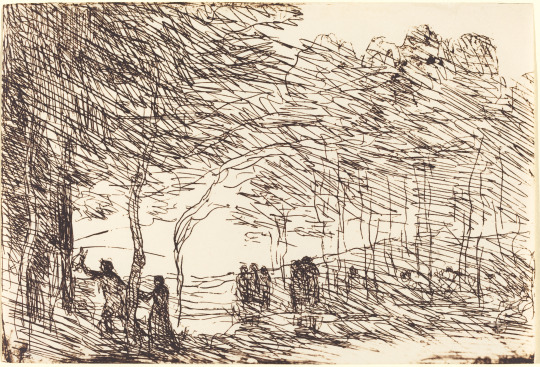


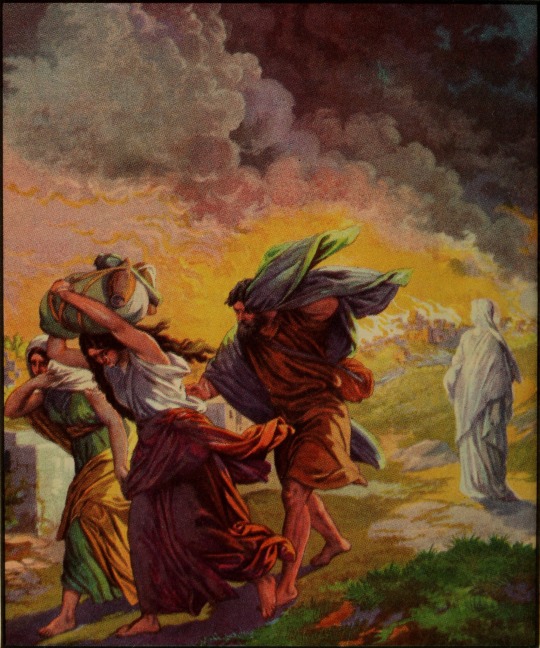

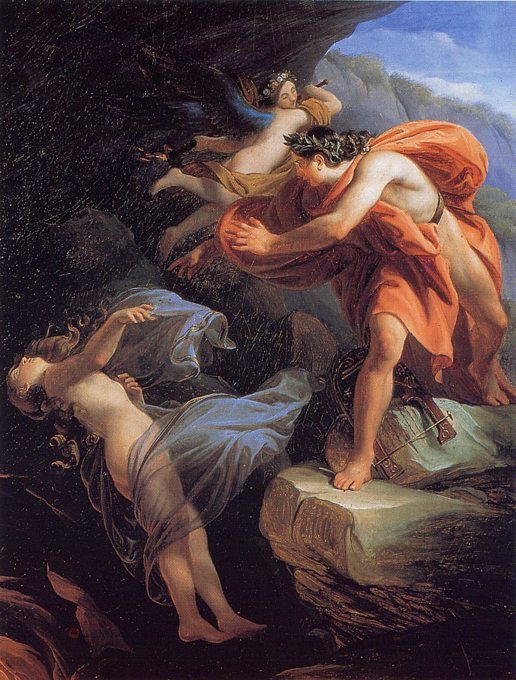

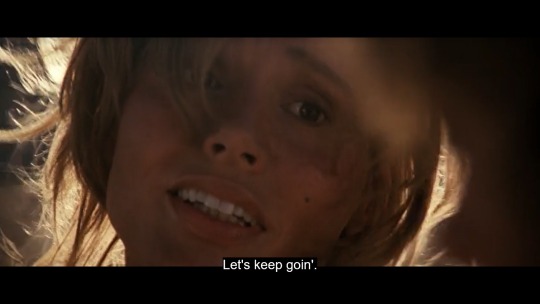




On loving, leaving, and (not) looking back
The Bible, New International Version - 1, 4 / Jean-Baptiste-Camille Corot, Orpheus Leading Eurydice (1860) - 2 / Thelma & Louise (1991) - 3, 9 / Bible Primer, The Augustana Synod (1919) - 5, 10 / Orpheus & Euridice, Ovid's Metamorphoses - 6, 8 / Enrico Scuri - Euridice Recedes into the Underworld - 7 / Thunderheart (1992) - 11 / The Modern Gomorrah (1978) - 12, 13
#brain rot strong today#all these parallels about gays driving cars away from cops and such#and the og bible story about how you cannot look back at sodom and gomorrah as you leave#and that split second at the end of the modern gomorrah where you don't know if frank is gonna look at sonny or over his shoulder#i'm going to eat drywall#the modern gomorrah#thunderheart#thelma & louise#orpheus & eurydice#movies#my posts#unreality
38 notes
·
View notes
Note
Lot's wife looks back at the burning city of Sodom and Gomorrah and sees nothing there instead. Somewhere in the Underworld, Orpheus looks back at Eurydice and turns into a pillar of salt.
what kind of sick prank school did you even graduate from to suggest this
1K notes
·
View notes
Text
would anyone like to read my kinda bad wikipedia poetry about orpheus and eurydice and sodom and gomorrah
15 notes
·
View notes
Note
I think we can agree that Dante and Vir definitely had something going on in the past
Indeed… I’m sure those two were Great Close Friends!! (Catholic Church Voice)
Sorry, couldn’t resist…
At this point, I think it’s pretty undeniable that Dante and Vir have romantic feelings for each other. That they’ve held these feelings in their hearts for over a decade, from their days together under the Church’s care, despite everything.
Of course, whether they ever… properly professed these feelings to one another, kissed or had sex is something I just can’t tell.
But, you know, it’s funny to me how many readers were… humble, I guess (?), towards the interpretation of virdante as a romantic pair.
Because I considered them to be obvious from the get-go.
I understand that this hesitation (?), I’ve seen has likely to do with the fact that ekuoto is technically on the shounen demographic, so most readers probably weren’t expecting a canon gay romance from more prominent characters, just the usual intense friendship between two guys (and the dismissal and lack of focus of the female love interest in the narrative) that people often joke about… but, still.
But!! Still!
I mean… Vir frenched his close friend (that he does seem to genuinely care about) Charlotte while never taking his eyes off Dante!! And then wiped off his mouth, while he whined about Dante’s miracle being a nod to the sins of Sodom. Which, to be fair, as far as I know, isn’t really about homosexuality, but in pop culture that’s the case!!
Vir brings up Dante at every single opportunity, without any prompting!! To whine that he’s going off to brothels to pretend he doesn’t want Vir/isn’t attracted to men!!
Pretty sure Vir chose his witch name to be Vergillius just so he could match with Dante, being the pitiful pining fool he is.
And Dante… Dante has Vir’s photo as his phone’s background!! Like, it’s obvious that there more people in that photo, including himself, but he just cropped it and left Vir. Just Vir.
Also, maybe this isn’t as obvious to readers who only read the translations, and maybe I’m grasping at insignificant straws, but…:


The word for “love” that he uses while thinking about Vir is “koi”(恋). Explicitly referring to romantic love.
Which just means that Dante thinks his (romantic) love, that Dante himself wasn’t enough for Vir… which we know that isn’t the case, but you know!
After chapter 72, they both have raised a bunch of death flags, particularly Vir, which has sorta left the fandom (across all languages!) screaming.
At which I have to say, if one of them must die, then at least let us have an arc where one of them goes to Gehenna to rescue the other a la Orpheus/Eurydice! (Please, Aruma-sensei!)
And that’s all I have to say on the matter! (<- says the one who just rambled unnecessarily when just a ‘yes’ or ‘no’ would’ve sufficed for your original comment)
#troperrific talks#troperrific answers#ekuoto tag#thanks for the comment anon#would any of you believe me if I said I’m not even that invested in virdante?#at least not as much as half the fandom and yet…
3 notes
·
View notes
Text
The story of Eurydice may actually be a late addition to the Orpheus myths. In particular, the name Eurudike ("she whose justice extends widely") recalls cult-titles attached to Persephone. According to the theories of poet Robert Graves, the myth may have been derived from another Orpheus legend, in which he travels to Tartarus and charms the goddess Hecate.[63]
The myth theme of not looking back, an essential precaution in Jason's raising of chthonic Brimo Hekate under Medea's guidance,[64] is reflected in the Biblical story of Lot's wife when escaping from Sodom. More directly, the story of Orpheus is similar to the ancient Greek tales of Persephone captured by Hades and similar stories of Adonis captive in the underworld.
0 notes
Text
Happy Ending
Catch the story mid-stream
and hear the pounding doubt
between his temples.
See the pivot, simple
on the balls of his feet.
Eurydice’s gasp of realization
not unlike Lot’s wife
who, upon turning, glimpses
her flaming city one last time
before she goes rigid.
But these are endings, not beginnings,
and the difference between stories
and real life is that real life keeps going.
I scroll the headlines—
1.5 degrees and climbing. Horizons
like the walls of Hades.
When you ask for a story, I know
you mean one about cartoon trains.
The chase and rescue. The close call.
But in these stories you’ll find that nothing
saves Sodom, that Eurydice is swallowed
whole by the earth.
I tidy the kitchen, read another email
urging a call to my representatives.
This isn’t the world I wanted to give you.
Once you said women could not
be rabbis and I wondered at that
trope, three thousand years old and lodged
already in your small bones.
What other stories do you know
that I haven’t told you?
Do you know how long Orpheus walks
to emerge from the underworld?
How lonely he must feel, and helpless,
how close he comes to the daylight?
Do you know that our seas will rise,
that the more stunning the sunset,
the more toxins in the atmosphere?
That, when snow falls, I ache to swallow
the landscape? Maybe you know already
that Orpheus finds his bride,
fights to hold on, step after
step through the earth’s intestines,
ahead, the growing circle of light.
Maybe you know already how it ends.
Though, when I tell you, I’ll describe
a finger of fresh air that finds its way
to his cheek. The quickening
of his pace as he approaches the threshold.
This time, he won’t look back.
— Ariel Friedman, featured in Bodega Magazine (source)
1 note
·
View note
Text
Eurydicean Coda (CN: rape, ‘corrective’ rape, orientation-play, bondage, despair, mental conditioning, watersports, rimming, various degrading things)
The pain came in waves, but then, so did everything else. The nausea came in waves, the violence came in waves, the shocks, drugs and beatings came in waves, the men's hips clapped against her ass like a storm-waves against a crumbling sea barrier, Valerie was dragged under waves in a burning ocean, pulled further from the light as each one crashed over her.
"We don't let girls think around here," is what they told her on the first night and taught her every night and day thereafter. Thoughts mean abstraction and abstraction means distance and distance would be a reprieve and there would be no reprieve. On the first night they had nailed her into a wooden coffin to sleep, still hogtied, her joints on fire, eyes burning from the cum that the men had shot into them, with headphones taped over her ears blaring recordings they'd made with Lily. She suffered there in perfect darkness and the noise would peak and trough, her Lily's screams ear-splittingly loud, her Lily's cries rising and falling, her Lily's voice almost too quiet to hear.
She didn't sleep that night, nor the next night, nor any night. They hurt her until she passed out, and if they deemed it prudent, they would wait some time before rousing her. Sometimes they choked her unconscious, other times they sedated her, but never, never sleep. Sleep was the first thing she'd really begged for, the first time she'd let the words slip from her lips to their ears, "I'll do anything."
"We know you'll do anything. You'll do anything for a warm glass of my piss," the man had said. Two days of no water later, he proved himself right.
They wanted to strip her to her soul, to erode all the defenses protecting her sense of self until it was bared to them like a quivering lump of jelly, and then they would re-shape it. Each fresh horror would be brought down upon her until she had no conscious defence other than to accept it as inevitable and retreat deeper into her mind, and then as it ebbed away a new torment would be brought forth to drag her back to the surface. The first time she had been roused by a cock filling her ring-gag and blasting a torrent of piss down her throat she'd almost drowned, and the sheer terror at it happening again had made her work to avoid passing out rather than seeking it out. Now it had been done so many times that it brought no terror, only pain and misery.
It was a similar tale with so many of their games. The bruising, the biting, the diet of piss and cum supplemented by bloating, cramping, nutrient-rich enemas, the viewing sessions of Lily's gang-rapes, the tattoos and piercings, the throat-fucking, ass-fucking, double-penetration and blowbangs, the stifling leather hoods, the strappados and Spanish donkeys, the taint of unwashed male musk that seeped into her skin every time a pair of sweaty balls was dragged over her face, the nightly quizzes of having a cock shoved between her lips and being asked which of Lily's holes it had just been inside, all of these things brought pain, disgust and despair, but the terror had faded. Even the sight of the dreaded cattle prod no longer made her heart skip a beat—though, its bite often did.
Now it was the pleasure that Valerie feared. At first it had looked like simple humiliation: feed the dumb dyke a bunch of viagra, MDMA and morphine, strap her over a frame, jam a souped-up Hitachi against her cunt and watch her cum her brains out while her owners laugh at her. That's what it had felt like, and it had felt that way the next time and the time after, and it hadn't seemed out of the ordinary when the men started groping her and stroking her—gentler than usual—just before she climaxed. When they edged her, teased her, brought her to the brink and held her back, and only finally let her cum with a man's cock eight inches deep inside her, there wasn't a thought left in her head.
When they gave her the choice, she knew something was wrong. "Hitachi or bath time?" they'd asked, and the choice had shocked her so much that she'd just mumbled she'd do whichever one they preferred. That got her a hard slap across the cheek, hard enough to make her teeth shake. She picked the Hitachi over being waterboarded, of course, but she knew it was a trap. She began to notice the withdrawal symptoms, the despair and bone-deep exhaustion that came from coming down off of the MDMA and morphine, and she noticed what went along with it: when she was coming down, she was left unfilled. The men refrained from fucking, plugging, or even touching her cunt. The first time they caught her trying to touch herself, they broke her index finger and fitted her with a chastity belt.
They'd stopped strapping her down, they alternated between cock and vibrator, fingers and vibrator, sometimes fingers and cock. They still made her peel back the foreskin of a thick, greasy, unwashed cock and lick it clean, but now this crude ritual of humiliation coincided with her pleasure sessions. They kept making her choose. "What will it be, Valerie? Hitachi, or drink piss until your stomach feels fit to burst? Hitachi, or have chili oil rubbed into your cunt and asshole? Hitachi, or lick our sweaty assholes while we gang-rape your pretty wife? Hitachi or cattle prod, or caning, or the confinement coffin? Hitachi or standing in place for the night in a dark room with a chastity belt and nothing but your own awful thoughts for company?" At the start of her captivity, she would have chosen the pain and taken pride in it. Now, it was the closest thing to a rest. How could she make any other choice, now that the tide had come in so far, and the water was above her neck?
They made her work for it. They made her go on top. They made her bounce up and down as she looked down at the face of her owner. They made her cum while she kissed the man who she'd watched rape her wife only hours ago. They made her do it again, and this time, she came without the vibrator at all, and she knew in her heart that soon they would make her cum without the drugs.
She felt nothing at this. She was still Valerie. It hadn't changed her any more than she'd already been changed, and hadn't broken anything that wasn't already broken. Her captors had disagreed, evidently, and seen fit to provide her with a reward: with their mouths gagged, their hands bound up in leather mittens, and their cunts locked away in steel belts, Valerie and Lily were allowed to spend a night together. They embraced each other atop a pile of rags, warming each other's cheeks with their tears. Perhaps they slept.
The methods changed. The pleasure sessions went away and the pain sessions returned. Valerie ached for the pleasure to return, to be filled, to be fucked, to be smeared across the mattress underneath a man a foot taller and a hundred pounds heavier than her. She knew that they wanted her to beg, to admit defeat, to show that she was broken. So, she begged. They laughed and spat in her face, but at least gave her a cock to nurse while they fisted her asshole.
Domestic work crept in amongst the punishments and perversion. Shackled, hooded, they made her sweep floors and wash dishes, only seeing her own work through tiny slits in the leather. They brought in other men to use her. They made her serve drinks, before and after she'd been fucked. They were not gentle, but gentler—they were more concerned with their own pleasure than her training—and like the pleasure had before it, servitude became ersatz sleep.
These new methods of training grew in intensity, and like the cruder ones before, they also came in waves. These waves did not torment Valerie as the previous ones did. The waves can not thrash you, after all, once you are deep beneath them.
60 notes
·
View notes
Text

so we talk about the foreshadowing in harrow’s verbal line, but i haven’t seen anyone talk about those next lines. that act of harrow turning her back on gideon is literal when it comes to forgetting her:





and i know for a fact that other people have definitely made the connection with the back-turning and well-known stories like orpheus looking back at eurydice or lot’s wife looking back at sodom and i think it’s notable that harrow never turns back around… i really want to see this theme continued in alecto the ninth nona the ninth
#hey it’s me again back with another parallel post#and it’s not even about the new content#boo me#the locked tomb#gideon the ninth#harrow the ninth#op#anyways someone play bonnie tyler total eclipse of the hear#t
517 notes
·
View notes
Text
he tells him to take his brother and run as fast as he can and don’t look back and then as soon as dean turns to run the first thing john does is look back…. sodom and gomorrah…. orpheus and eurydice…. you look back and you’ve already lost…. but oh you have to look back, there was no other way…..
#john winchester#timothy's txts.#turning back for the look of destruction and you are ruined but you don’t know it yet…..#you don’t know about the salt you’ve ground deep into your wound…. you don’t know….#spn 1x01#spn#supernatural#tim’s watch party 🧍🏻
14 notes
·
View notes
Text
If you ever wonder why I'm still here
Don't think I feel obligated
My love is not unconditional
I'm not a mother and you're not my child
My love is not heroic
I'm not Orpheus and you're not Eurydice
My love is not foolish
I'm not a pillar of salt and you're not Sodom
Why am I still here?
It's you,
It's you
3 notes
·
View notes
Text
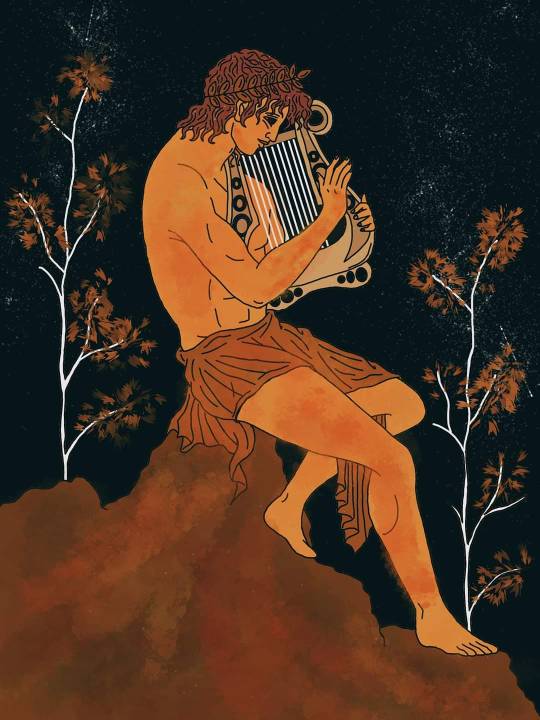
Mythology
Early life
According to Apollodorus and a fragment of Pindar, Orpheus' father was Oeagrus, a Thracian king, or, according to another version of the story, the god Apollo. His mother was (1) the muse Calliope, (2) her sister Polymnia, (3) a daughter of Pierus, son of Makednos or (4) lastly of Menippe, daughter of Thamyris. According to Tzetzes, he was from Bisaltia. His birthplace and place of residence was Pimpleia close to the Olympus. Strabo mentions that he lived in Pimpleia. According to the epic poem Argonautica, Pimpleia was the location of Oeagrus' and Calliope's wedding. While living with his mother and her eight beautiful sisters in Parnassus, he met Apollo, who was courting the laughing muse Thalia. Apollo, as the god of music, gave Orpheus a golden lyre and taught him to play it. Orpheus' mother taught him to make verses for singing. He is also said to have studied in Egypt.
Orpheus is said to have established the worship of Hecate in Aegina. In Laconia Orpheus is said to have brought the worship of Demeter Chthonia and that of the Κόρες Σωτείρας (Kóres Sōteíras; 'Saviour Maidens'). Also in Taygetos a wooden image of Orpheus was said to have been kept by Pelasgians in the sanctuary of the Eleusinian Demeter.
According to Diodorus Siculus, Musaeus of Athens was the son of Orpheus.
Adventure as an Argonaut
Main article: Argonautica
The Argonautica (Ἀργοναυτικά) is a Greek epic poem written by Apollonius Rhodius in the 3rd century BC. Orpheus took part in this adventure and used his skills to aid his companions. Chiron told Jason that without the aid of Orpheus, the Argonauts would never be able to pass the Sirens—the same Sirens encountered by Odysseus in Homer's epic poem the Odyssey. The Sirens lived on three small, rocky islands called Sirenum scopuli and sang beautiful songs that enticed sailors to come to them, which resulted in the crashing of their ships into the islands. When Orpheus heard their voices, he drew his lyre and played music that was louder and more beautiful, drowning out the Sirens' bewitching songs. According to 3rd century BC Hellenistic elegiac poet Phanocles, Orpheus loved the young Argonaut Calais, "the son of Boreas, with all his heart, and went often in shaded groves still singing of his desire, nor was his heart at rest. But always, sleepless cares wasted his spirits as he looked at fresh Calais."
Death of Eurydice
The most famous story in which Orpheus figures is that of his wife Eurydice (sometimes referred to as Euridice and also known as Argiope). While walking among her people, the Cicones, in tall grass at her wedding, Eurydice was set upon by a satyr. In her efforts to escape the satyr, Eurydice fell into a nest of vipers and suffered a fatal bite on her heel. Her body was discovered by Orpheus who, overcome with grief, played such sad and mournful songs that all the nymphs and gods wept. On their advice, Orpheus traveled to the underworld. His music softened the hearts of Hades and Persephone, who agreed to allow Eurydice to return with him to earth on one condition: he should walk in front of her and not look back until they both had reached the upper world. Orpheus set off with Eurydice following; however, as soon as he had reached the upper world, he immediately turned to look at her, forgetting in his eagerness that both of them needed to be in the upper world for the condition to be met. As Eurydice had not yet crossed into the upper world, she vanished for the second time, this time forever.
The story in this form belongs to the time of Virgil, who first introduces the name of Aristaeus (by the time of Virgil's Georgics, the myth has Aristaeus chasing Eurydice when she was bitten by a serpent) and the tragic outcome. Other ancient writers, however, speak of Orpheus' visit to the underworld in a more negative light; according to Phaedrus in Plato's Symposium, the infernal gods only "presented an apparition" of Eurydice to him. In fact, Plato's representation of Orpheus is that of a coward, as instead of choosing to die in order to be with the one he loved, he instead mocked the gods by trying to go to Hades to bring her back alive. Since his love was not "true"—he did not want to die for love—he was actually punished by the gods, first by giving him only the apparition of his former wife in the underworld, and then by being killed by women. In Ovid's account, however, Eurydice's death by a snake bite is incurred while she was dancing with naiads on her wedding day.
Virgil wrote in his poem that Dryads wept from Epirus and Hebrus up to the land of the Getae (north east Danube valley) and even describes him wandering into Hyperborea and Tanais (ancient Greek city in the Don river delta) due to his grief.
The story of Eurydice may actually be a late addition to the Orpheus myths. In particular, the name Eurudike ("she whose justice extends widely") recalls cult-titles attached to Persephone. According to the theories of poet Robert Graves, the myth may have been derived from another Orpheus legend, in which he travels to Tartarus and charms the goddess Hecate.
The myth theme of not looking back, an essential precaution in Jason's raising of chthonic Brimo Hekate under Medea's guidance, is reflected in the Biblical story of Lot's wife when escaping from Sodom. More directly, the story of Orpheus is similar to the ancient Greek tales of Persephone captured by Hades and similar stories of Adonis captive in the underworld. However, the developed form of the Orpheus myth was entwined with the Orphic mystery cults and, later in Rome, with the development of Mithraism and the cult of Sol Invictus.
Death
According to a Late Antique summary of Aeschylus' lost play Bassarids, Orpheus, towards the end of his life, disdained the worship of all gods except the sun, whom he called Apollo. One early morning he went to the oracle of Dionysus at Mount Pangaion to salute his god at dawn, but was ripped to shreds by Thracian Maenads for not honoring his previous patron (Dionysus) and was buried in Pieria. Here his death is analogous with that of Pentheus, who was also torn to pieces by Maenads; and it has been speculated that the Orphic mystery cult regarded Orpheus as a parallel figure to or even an incarnation of Dionysus. Both made similar journeys into Hades, and Dionysus-Zagreus suffered an identical death. Pausanias writes that Orpheus was buried in Dion and that he met his death there. He writes that the river Helicon sank underground when the women that killed Orpheus tried to wash off their blood-stained hands in its waters. Other legends claim that Orpheus became a follower of Dionysus and spread his cult across the land. In this version of the legend, it is said that Orpheus was torn to shreds by the women of Thrace for his inattention.
Ovid recounts that Orpheus ...
had abstained from the love of women, either because things ended badly for him, or because he had sworn to do so. Yet, many felt a desire to be joined with the poet, and many grieved at rejection. Indeed, he was the first of the Thracian people to transfer his affection to young boys and enjoy their brief springtime, and early flowering this side of manhood.
— Ovid. trans. A. S. Kline, Ovid: The Metamorphoses, Book X
Feeling spurned by Orpheus for taking only male lovers (eromenoi), the Ciconian women, followers of Dionysus, first threw sticks and stones at him as he played, but his music was so beautiful even the rocks and branches refused to hit him. Enraged, the women tore him to pieces during the frenzy of their Bacchic orgies. In Albrecht Dürer's drawing of Orpheus' death, based on an original, now lost, by Andrea Mantegna, a ribbon high in the tree above him is lettered Orfeus der erst puseran ("Orpheus, the first pederast").
His head and lyre, still singing mournful songs, floated down the River Hebrus into the sea, after which the winds and waves carried them to the island of Lesbos, at the city of Methymna; there, the inhabitants buried his head and a shrine was built in his honour near Antissa; there his oracle prophesied, until it was silenced by Apollo. In addition to the people of Lesbos, Greeks from Ionia and Aetolia consulted the oracle, and his reputation spread as far as Babylon.
Cave of Orpheus' oracle in Antissa, Lesbos
Orpheus' lyre was carried to heaven by the Muses, and was placed among the stars. The Muses also gathered up the fragments of his body and buried them at Leibethra below Mount Olympus, where the nightingales sang over his grave. After the river Sys flooded
Leibethra, the Macedonians took his bones to Dion. Orpheus' soul returned to the underworld, to the fields of the Blessed, where he was reunited at last with his beloved Eurydice.
Another legend places his tomb at Dion, near Pydna in Macedon. In another version of the myth, Orpheus travels to Aornum in Thesprotia, Epirus to an old oracle for the dead. In the end Orpheus commits suicide from his grief unable to find Eurydice.
"Others said that he was the victim of a thunderbolt."
From Wikipedia
••••••••••••••••••••••••••••••••••••••••••••••••••••••••••••••
Orpheus the musician & beast tamer.
Art by Brittany Beverung @artistfuly
9 notes
·
View notes
Photo










a diatribe on looking back
(slaughterhouse-five, kurt vonnegut/the burning of sodom-camille corot/snow and dirty rain-richard siken/fire in rome-hubert robert/i know the end-phoebe bridgers/”the end” cinema billboard/daenerys-ASOIAF/portrait of a lady on fire/Portrait de la jeune fille en feu/orpheus and eurydice)
420 notes
·
View notes
Text
my brother mixed up the story of orpheus and eurydice with the story of sodom and gomorrah
it was funny then, but i'm not sure its as funny now that i look back at it.
2 notes
·
View notes
Text
Étrangetés de la nature II/V
Hou Hou cachons-nous dit Maître Hibou


Ce qu'ont fait les Leprechauns ? Voilà l'entrée de leur monde souterrain. La nuit, une lumière d'or brille entre les racines. C'est là qu'est cachée leur marmite remplie de louis d'or, leur trésor.

La faucheuse en tenue de randonnée

Entrée des enfers désertée par Cerbère. Eurydice, la nymphe des arbres, et Orphée pourraient en sortir sans problème de nos jours. Ils sont nés trop tôt !

Est-ce Sodome ou Gomorrhe ?
Attention de ne pas regarder en arrière, vous pourriez être pétrifiés à votre tour car d'aucuns n'y voit qu'une demoiselle coiffée mais elle a dû malheureusement et malencontreusement se retourner, elle !


Cœur de sorcière un peu trouble. C'est que les jeteuses de sorts ne se le laissent pas prendre si facilement, leur cœur !
à suivre...
Flo
1 note
·
View note
Text
71. The Myth of Not Looking Back
Each human heart has the same approach; it doesn’t beat to grieve for what the eyes can’t see; instead, fills moons with all our shadows and undoes the laces of our tongues; sticks our fingers, exactly, stickily, gently where they shouldn’t go.
There are no werewolves anymore, but silver-lit tides still swell
beneath the moons of of those worlds still blessed by liquid seas.
The voices of fresh-made corpses ask far too many questions
about the various causes of their unexpected slaughters.
Living in this cruel current of time we can’t all survive -
Like sooty mice on the Underground’s tracks;
or sleepy birds on overhead wires.
A fatal shock from a peanut fragment
triggered by a trip to London zoo
Or watch a holy man take a sinusoidal dagger;
remove, then lift the heart to the sun.
Look back to see the blood-debt paid;
drops rolled to velvet in the Aztec sand.
Or real færies enticing
young pirates and childish astronauts
down abandoned garden wells, or
Lot’s unnamed wife,
cosy in Sodom,
ignoring the warnings of angels
salted for a tiny glimpse of home.
And the final straw?
The fair Eurydice lost
to that f*ck-wit Orpheus
unable to comply with a simple
directive from Hell.
Isn’t life always too thin,
way too reedy
and easily blown
to not look back?
Don’t look back,
and you could keep
the thing you think you want,
but if you didn’t look back,
maybe you just didn’t need it any more.
25th July 2019
#spilled ink#poetry#poems#my poem#sdheath#poemdujouir#poets on tumblr#poem#poemdujour#poet#sd heath#new poets on tumblr
1 note
·
View note
Note
OK OK OK As a writer myself I know this is BAD to ask… but considering there are two major ways of reading the AoS epilogue (they are both actually dead and in an imagined/real afterlife vs BJ was ‘turned’ and they both run off into the sunset together)… in your heart of hearts… what do you feel happened? I ask only because yday when I expressed my EXTREME sadness you commented back something that would imply to me that the latter interpretation might be the ‘true’ one? I KNOW IT doesn’t WORK LIKE THIS BUT!!! I KNOW it’s MEANT TO BE OPEN TO INTERPRETATION I KNOW THIS!!! I do! But.
@partlyironic SADLKFSJFJA I AM SO SO SORRY I NEED U TO KNOW IN MY HEART OF HEARTS I THOUGHT THIS WAS A HAPPY ENDING. I THINK I AM POSSIBLY BAD AT CATEGORIZING GENRE IT TURNS OUT AND I AM. SO SO AORRY. INTERPRETATION UNDER THE CUT BC IT GOT REALLY LONG
Ough again I am so sorry LOL. Okay I'll say in my mind when I initially wrote this, I was thinking of a sort of "medium" happy ending. Like, they're both too deep in at this point to just Go Home like nothing has changed. Hawkeye would be an active danger to his father / community, and, if BJ brought him home, would be the same to his wife and kid, hence "You found me in a war zone, BJ. There’s nothing you could pick up in a minefield you should take home to your family." He sees the path he's on and thinks, okay, well, this could be the last time I'm really "human." Maybe I can get this under control, maybe I can't, but I can't know, and it's the best thing to do to remove the risk entirely.
And so I envisioned that as a sort of dual Lot's wife / Orpheus moment for BJ. I wanted to sort of set up this idea of, okay, if he 'looks back,' so to speak, what's going to happen? Well, one idea is that Hawkeye kills him, now or later. Pillar of salt'd, and Sodom still burns. But then again, if BJ can do this, maybe Eurydice/Hawk is "saved" from the underworld (becoming monstrous), and lives on in memory, not as a shade. But he doesn't really account for a third option, which is, like, what if Orpheus looked back, saw Eurydice get yanked into the underworld, and just...followed? Like, okay, not ideal, but better to be together in hell than separate in life. And the thing about pillars of salt/ash is that they don't burn. They can just hang out in a flaming city no problem. Sure, some things are worse now: their options are really limited, for one, as it's pretty damned hard to go back to your old human life when you're just loose ash, and also it's hard to do a lot of other things when your city that you love more than anything, more than even God, maybe, is on fire all the time, but if you really love your city (and it turns out that you do) you're going to stay with it.
That's more or less how I saw this ending. It's the "happiest" ending possible under the circumstances. Though I will say I initially wrote it with the idea in mind that BJ's still fully human (in body.....) and Hawk's in some ambiguous, you-interpret-how-much-of-him-is-still-human state. But so far people seem to be reading it as they're both immortal, which, while not something that honestly ever entered my mind while writing, makes total sense, and is definitely not a bad reading at all.
Re: the afterlife thing... hmmmmmmg very very very interesting. I'll say that interpretation literally never came to mind at all LOL I was thinking of it as all very concrete, especially after Hawk's speech to Frank and later BJ about the Nothingness of death, but I'm intrigued! But then again what's an afterlife, really. This could be an afterlife of sorts. Especially given that one (or both, depending on your reading) of the guys did definitively die. It's an afterlife of some sort for Hawkeye, at least, and the rest is who knows what.
anyway I AM SORRY IF THIS WAS VERY SAD UNINTENTIONALLY BUT THANK U SO SO SO MUCH FOR READING AAAAAA <3
#partlyironic#asks#my fic#aspirin or sorrow#oh god y'all I am sorry#rolling up a newspaper and thwacking past me on the nose#YOU TAGGED H/C NOT EMOTIONAL EVISCERATION
1 note
·
View note